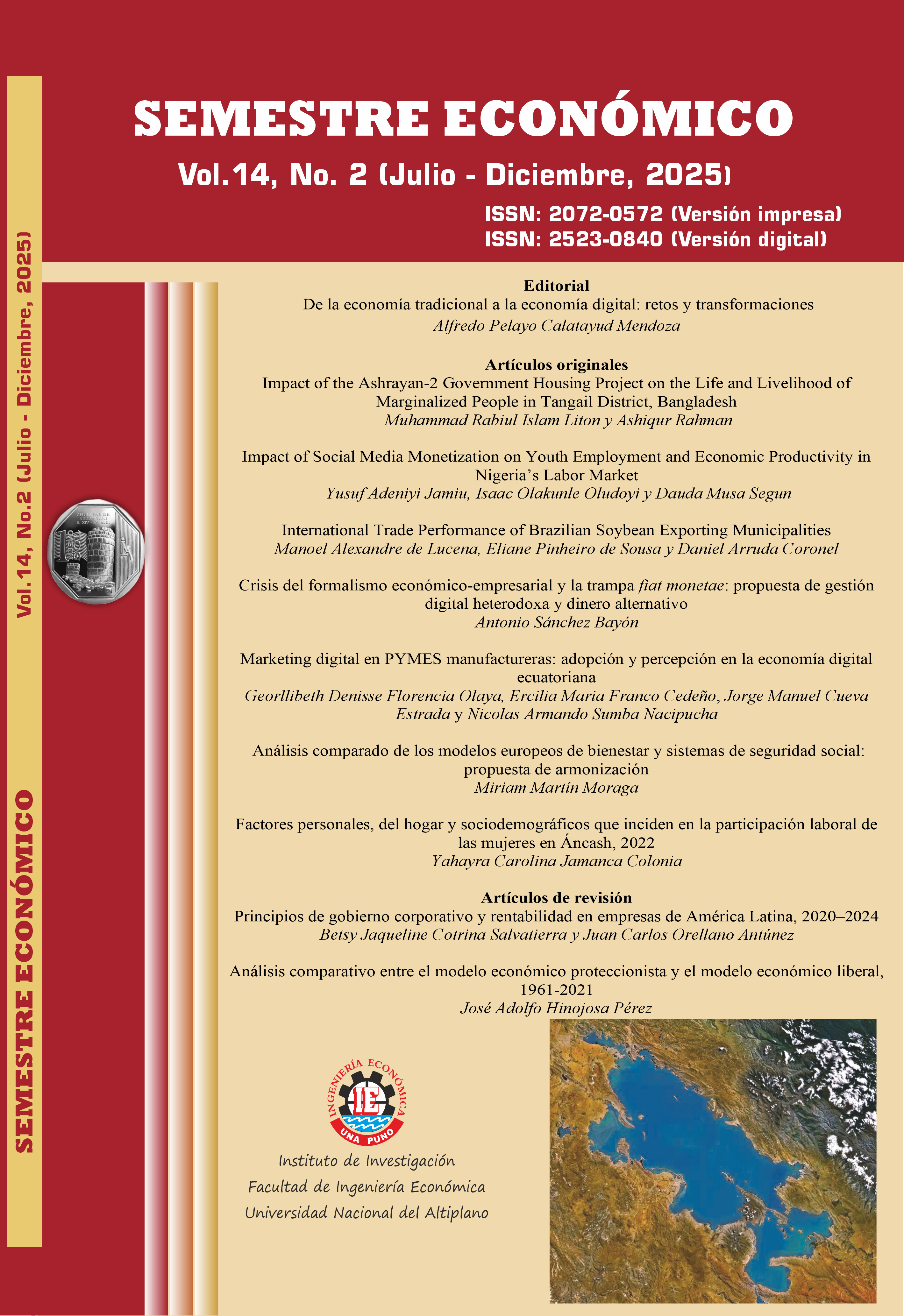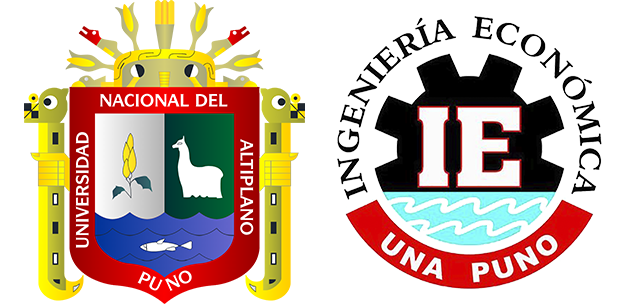Crisis of Economic-Business Formalism and Fiat Monetae Trap:A Proposal for Heterodox Digital Management and Alternative Money
DOI:
https://doi.org/10.26867/se.2025.v14i2.190Keywords:
Heterodox digital management, lt-money, lassroom experience-based learning, technovation, social-business digital currencies, corporate social responsibilityAbstract
Why the econometric formalism of the neoclassical synthesis doesn’t work in the digital economy and how
to undertake private initiatives to overcome the financial crisis based on fiat currency? Using heterodox
theoretical and methodological frameworks, this paper offers a review of the main changes resulting from
digitalization, which have revealed the flaws in mainstream approaches and how to overcome them by
reviewing the theory of money and the practice of social-business digital currencies (SBDCs). The main
goal is how to show the advantages of using the SBDC, as alt-money (private, participatory, and decentralized).
money), that promotes the transactions and it motivates agents to be more productive and autonomous,
while also it helps in the coordination of a spontaneous order that improves social-environmental recompenses.
References
Alcorn, S., Solarz, B. (2006). The autistic economist. Post-Autistic Economics Review, 38: 13-19.
Alonso, M.A., Sánchez-Bayón, A. (2024). Spanish Boom-bust Cycle Within the Euro Area: Credit Expansion, Malinvestments & Recession (2002-2014). Politická ekonomie, 72(4):597-625 https://doi.org/10.18267/j.polek.1429
Alonso, M. A., Sánchez-Bayón, A., Castro-Oliva, M. (2023). Teoría austriaca del ciclo económico aplicada al caso español: del inicio del euro a la gran recesión y su recuperación. Revista De Métodos Cuantitativos Para La Economía Y La Empresa, 35, 280–310. https://doi.org/10.46661/revmetodoscuanteconempresa.6837
Ammous, S. (2018). El patrón Bitcoin: la alternativa descentralizada a los bancos centrales (trad.). Barcelona: Deusto.
Anderson M (1986) The Unfinished Agenda: Essays on the Political Economy of Government Policy in Honour of Arthur Seldon. London: Institute of Economic Affairs.
Andreessen, M. (2014). Why Bitcoin Matters, New York Times (URL: https://dealbook.nytimes.com/2014/01/21/why-bitcoin-matters/; consultado en mayo de 2020).
Andresen, L., Boud, D., & Cohen, R. (2020). Experience-based learning. In Understanding adult education and training (pp. 225-239). Routledge.
Andreu, A., Sánchez-Bayón, A. (2019). Claves de Administración y Dirección de Empresas en la Posglobalización, Madrid: Delta Publicaciones.
Bailey, B.J. (1998). The luddite rebellion. New York: NYU Press.
BCE (2020). A deep dive into crypto financial risk (URL: A deep dive into crypto financial risks: stablecoins, DeFi and climate transition risk (europa.eu); consultado en diciembre de 2023).
Bachiller, P., y Badía, G. (2020). The flip teaching as tool to improving students’ sustainable learning performance in a financial course. Sustainability, 12(23), 9998.
Ballantine, J. y McCourt, P. (2009). Accounting undergraduates' perceptions of cooperative learning as a model for enhancing their interpersonal and communication skills to interface successfully with professional accountancy education and training. Accounting Education: an international journal, 18(4-5), 387-402.
Barrows, H. (1986). A taxonomy of problem based learning methods. Medical Education, 20, 481-486.
Barrows, H. S. (1996). Problem‐based learning in medicine and beyond: A brief overview. New directions for teaching and learning, 1996(68), 3-12.
Beagon, Ú., Niall, D., y Ní Fhloinn, E. (2019). Problem-based learning: student perceptions of its value in developing professional skills for engineering practice. European Journal of Engineering Education, 44(6), 850-865.
Beker, V. (2010). On the economic crisis and the crisis of economics. Real-world Economics Review, 56: 72–94.
Berentsen, A. (2018). A Short Introduction to the World of Cryptocurrencies. St. Louis: Federal Reserve Bank of St. Louis.
Bernanke, B. (2004). The Great moderation, Kansas City: FED.
Bindseil, U. (2019). Central Bank Digital Currency: Financial System Implications and Control, International Journal of Political Economy, 48(4), 303-335
Boettke, P., Haeffele-Balch, S., Storr, V. (2016). Mainline Economics. Arlington: Mercatus Center-George Mason University
Buchanan, J., Tullock, G. (1962). The calculus of consent. Ann Arbor: University of Michigan Press.
Cassel, G. (1923). The theory of social economy (trans. J. McCabe). London: Fisher Unwin Limited.
Castaño J (2001) Discusión francesa sobre la enseñanza de la economía. Cuadernos de Economía, 20(35): 287-296.
Chen, Z., Mirza, N., Huang, L., & Umar, M. (2022). Green banking—can financial institutions support green recovery? Economic Analysis and Policy, 75, 389-395.
Conley, J.P. (2017). Blockchain and the Economics of Crypto-tokens and Initial Coin Offerings. Vanderbilt University Press.
Cortés, F. (2008). Las monedas sociales, Almería: Cajamar.
Corrons, A. (2017). Monedas complementarias: dinero con valores, Revista Internacional de Organizaciones, 18: 109–134.
Coyle, D. (2012). What’s the use of economics? Teaching the dismal science after the crisis. London: London Publishing Partnership.
Cubeiro, J.L. (2012). Del capitalismo al talentismo, Bilbao: Univ. Deusto.
Cueva, J., Sánchez-Bayón, A. (2024a). Estudio bibliométrico de Economía Digital y sus tendencias. Revista De Estudios Empresariales. Segunda Época, (1): 195–209. DOI: https://doi.org/10.17561/ree.n1.2024.8229
Cueva, J., Sánchez-Bayón, A. (2024b). Gestión de la Felicidad. Bibliometría y Tendencias. ANDULI, 26: 1-19. DOI: https://doi.org/10.12795/anduli.2024.i26.01
Demsetz, H. (2008). From economic man to economic system. Cambridge University Press, Cambridge.
Domenech, A., Sanchez-Bayón, A. (2024a). Cuestionando el modelo Bernanke-Blanchard en la Eurozona: Ilustración del caso español. Semestre Económico, 13(2), 55–69. https://doi.org/10.26867/se.2024.v13i2.171
Domenech, A., Sánchez-Bayón, A. (2024b). Revisión heterodoxa de la Macroeconomía convencional: discrepancias con el modelo Bernanke-Blanchard. Encuentros Multidisciplinares, 77: 1-14. Eurozona (encuentros-multidisciplinares.org)
Easterlin, R.A. (1974). Does Economic Growth Improve the Human Lot? en David, P., Reder, M. (eds.). Nations and Households in Economic Growth, New York: Academic Press Inc.
Easterlin, R.A., et al (2010). The happiness-income paradox revisited. Proceeding of the National Academy of Sciences, 107(52): 22463-68.
Edelman (2020). Edelman (URL: https://www.edelman.com/; consultado: abril de 2022).
Eggertsson, T. (1990). Economic behaviour and institutions. Cambridge: Cambridge University Press
Enciso, E. (2018). Las criptomonedas, el futuro de la economía mundial. (URL: https://www.utadeo.edu.co/es/noticia/destacadas/expeditio/264566/las-criptomonedas-el-futuro-de-la-economia-mundial; consultado: mayo 2021).
Escohotado, A. (2008). Los enemigos del comercio. Madrid: Espasa
Eucken, W. (1948). Soziale Marktwirtschaft (p.113-131), in Salin, E. (1948). Synopsis. Festgabe für Alfred Weber, Heidelberg: Schneider Heidelberg.
Felicetti, A. M., Corvello, V., & Ammirato, S. (2024). Digital innovation in entrepreneurial firms: a systematic literature review. Review of Managerial Science, 18(2), 315-362.
Field, A. (1999). New Economic History and Law and Economics, en VV.AA. (1999). Elgar Encyclopedia of Law and Economics. Cheltenham: E.E. Elgar, p. 728–753
Fortanet C, González C, Mira E, López J (2013) Aprendizaje cooperativo y flipped classroom, en Tortosa, M. T. et al (2013) XI Jornadas de Redes de Investigación en Docencia Universitaria. Alicante: Univ. Alicante, pp. 1151-1162. https://bit.ly/2s8AqgJ
Frey, B. (2018). Economics of Happiness, Basel: University of Basel & Springer.
FTC (2022). Guides for the Use of Environmental Marketing Claims (Green Guides). Washington: Federal Trade Commission.
Furubotn, E., Richter, R. (2005). Institutions and economic theory: the contribution of the new institutional economics, Ann Arbor: University of Michigan Press
Gallardo, I., et al. (2019). Análisis del anonimato aplicado a las criptomonedas. Río Cuarto: XXV Congreso Argentino de Ciencias de la Computación.
Gaus, G. (2020). A Branch on the Mainline: Hayek’s Analysis of Complex Adaptive Systems. Cosmos + Taxis, 7(5), 32-41.
García, D., Sánchez-Bayón, A. (2021). Cultural consumption and entertainment in the Covid-19 lockdown in Spain: Orange economy crisis or review? VISUAL REVIEW, 8(2): 131-149
García-Vaquero M, Daumann F, Sánchez-Bayón A. (2024). European Green Deal, Energy Transition and Greenflation Paradox under Austrian Economics Analysis. Energies, 17(15):3783 (1-16). https://doi.org/10.3390/en17153783
Glaser, F., et al. (2014). Bitcoin – Asset or currency? Revealing users´ hidden intentions. Tel Aviv: ECIS.
Goldschmidt, N. (2004). Alfred Müller-Armack and Ludwig Erhard: Social Market Liberalism, Freiburger Diskussionspapiere zur Ordnungsökonomik (nº4/12), Freiburg: Albert Ludwigs-Universität Freiburg.
González, E., Sánchez-Bayón, A. (2019). Nuevas tendencias en RR.HH. y desarrollo del talento profesional. Porto: Ed. Sindéresis.
Handrianto, C., & Rahman, M. A. (2018). Project based learning: a review of literature on its outcomes and implementation issues. LET: Linguistics, Literature and English Teaching Journal, 8(2), 110-129.
Hayek, F. (1976). Denationalisation of money: the argument refined. An analysis of the theory and practice of concurrent currencies. London: The Institute of Economic Affairs.
Hayek, F. (1988). The Fatal Conceit: The Errors of Socialism. Chicago: The University of Chicago Press.
Hoppe, H.H. (1995). Economic Science and the Austrian Method. Auburn: Mises Institute.
Huerta de Soto, J. (1998). Dinero, crédito bancario y ciclos económicos. Madrid: Unión Editorial.
Huerta de Soto, J. (2000). La Escuela Austriaca. Madrid: Síntesis.
Huerta de Soto, J. (2009). The theory of the dynamic efficiency. London: Routledge
Huerta de Soto, J., Sánchez-Bayón, A., Bagus, P. (2021). Principles of Monetary & Financial Sustainability and Wellbeing in a Post-COVID-19 World: The Crisis and Its Management. Sustainability, 13(9): 4655 (1-11). https://doi.org/10.3390/su13094655
Hülsmann, J.G. (2012). Theory of Money and Fiduciary Media: Essays in Celebration of the Centennial. Auburn: Mises Institute
Hülsmann, J.G. (2007). Mises: The Last Knight of Liberalism. Alabama: Mises Institute
Karsten, S. (1985). Eucken´s ´Social Market Economy´ and its test in post-war West Germany: the economist as social philosopher developed ideas that paralleled progressive thought in America. The American Journal of Economics and Sociology, 44(2): 169-183.
Keynes, J. (1930). Economic Possibilities for our Grandchildren. London: Macmillan.
Kollmann, T., Kleine-Stegemann, L., de Cruppe, K., & Strauss, C. (2022). Eras of digital entrepreneurship: connecting the past, present, and future. In VV.AA. Handbook of digital entrepreneurship (pp. 49-73). Edward Elgar Publishing.
Kurzweil, R. (2005). The Singularity is Near. New York: Penguin Group.
Lakomski-Laguerre, O., Desmedt, L. (2015). L’alternative monétaire Bitcoin : une perspective institutionnaliste. Revue de la régulation. Capitalisme, institutions, pouvoirs, 18: 1-22. https://journals.openedition.org/regulation/11489
Lansky, J. (2018). Possible state approaches to cryptocurrencies. Journal of Systems integration. 9(1): 19-31.
Mankiw, N.G. (2006). The Macroeconomist as Scientist and Engineer. Journal of Economic Perspectives, 20(4): 29-46. DOI: 10.1257/jep.20.4.29
Mariana, I. (1599). De rege et regis institutione. Toleti: apud Petrum Rodericum (escaneado por Univ. Valladolid, URL: Ioannis Marianae…De rege et regis institutione libri III...(uva.es); SC_12527.pdf. http://uvadoc.uva.es/handle/10324/34751)
Ménard, C., Shirley, M. (2012). New institutional economics from early intuition to a new paradigm? Ronald Coase Institute Working Paper (no. 2).
Miquel, A. B., & Sánchez Bayón, A. (2025). Mejoras y ajustes del PIB: ¿cómo medir un bienestar más realista? FACE: Revista De La Facultad De Ciencias Económicas Y Empresariales, 25(1), 5–23. https://doi.org/10.24054/face.v25i1.3571
Miragaya-Casillas, C., Aguayo-Estremera, R., Ruiz-Villaverde, A. (2023). University students, economics education, and self-interest. A systematic literature review. International Review of Economics Education, 43: 100266. https://doi.org/10.1016/j.iree.2023.100266
Mises, L. (1912). Theorie des Geldes und der Umlaufsmittel. Wien: Verlag von Duncker & Humblot
Mises, L. (1949): Human action. A treatise on Economics. New Haven: Yale Univ. Press.
Mises, L. (1978). Notes and Recollections, South Holland: Libertarian Press.
Moore, G. (1965). Cramming more components onto integrated circuits. Electronics, 38(8): 114-120.
Mougayar, W., (2016). The Business Blockchain. Hoboken: John Wiley & Sons Inc.
Müller-Armack, A. (1953). Soziale Marktwirtschaft
Murphy, R.P. (2011). Study Guide to The Theory of Money and Credit. Auburn, Alabama: Mises Institute.
Murphy, R.P. (2015). Let There Be Money: The free market has its own brand of fiat. Foundation for Economic Education: The Freeman (www.fee.org).
Nakamoto, S. (2008a). Bitcoin: A Peer-to-Peer Electronic Cash System (URL: bitcoin.pdf & Bitcoin: A Peer-to-Peer Electronic Cash System | Satoshi Nakamoto Institute; consultado en septiembre de 2023).
Nakamoto, S. (2008b). Bitcoin P2P e-cash paper (URL: Bitcoin P2P e-cash paper | Satoshi Nakamoto Institute; consultado en septiembre de 2023).
North, D. (1971). Institutional change and economic growth. Journal of Economic History, 31(1):118–125
North, D. (1984). Transaction costs, institutions, and economic history. J. Inst. Theor. Econ., 140:7–17
North, D. (1990). Institutions, Institutional Change and Economic Performance. Cambridge: Cambridge University Press.
Ostrom, E. (2005). Understanding institutional diversity. Princeton: Princeton University Press.
Oloyede, A. A., Faruk, N., Noma, N., Tebepah, E., & Nwaulune, A. K. (2023). Measuring the impact of the digital economy in developing countries: A systematic review and meta-analysis. Heliyon, 9(7). e17654. doi: 10.1016/j.heliyon.2023.e17654
Ozili, P. K. (2023). Central bank digital currency research around the World: a review of literature. Journal of Money Laundering Control, 26(2), 215-226.
PAE (2000)- post-autistic economics newsletter (URL: Issue no. 1, Post-Autistic Economics Newsletter (paecon.net); consultado oct. 2021).
Parlamento Europeo (2022). Cryptocurrency dangers and the benefits of EU legislation (URL: Cryptocurrency dangers and the benefits of EU legislation | Topics | European Parliament (europa.eu); consultado dic. 2023).
Paul, J., Alhassan, I., Binsaif, N., & Singh, P. (2023). Digital entrepreneurship research: A systematic review. Journal of Business Research, 156, 113507.
Pérez-Espés, C., Cea D’Ancona, F., Cervera Oliver, M. (2022). ¿Cómo fomentar las competencias profesionales? Aplicación del Aprendizaje Basado en Problemas en Contabilidad de Costes. Revista de Educación en Contabilidad, Finanzas y Administración de Empresas, 13: 17-39. https://dx.doi.org/10.12795/EDUCADE.2022.i13.03
Pettinger, T. (2021). Economics without the boring bits. London: Welbeck.
Pigou, A. C. (1920). The Economics of Welfare. London: Macmillan
Pühringer, S.; Bäuerle, L. (2018). What economics education is missing: The real world, Working Paper Serie, No. Ök-37, Cusanus Hochschule, Institut für Ökonomie und Institut für Philosophie, Bernkastel-Kues. https://hdl.handle.net/10419/196159
Purnomo, A., Susanti, T., Sari, A. K., Firdaus, M., & Dewi, R. (2020, August). A study of digital entrepreneurship through bibliometric visualizing from 1993 to 2019. In 2020 International Conference on Information Management and Technology (ICIMTech) (pp. 911-915). IEEE.
Rodrik D, Subramanian A, Trebbi F (2004) Institutions rule: the primacy of institutions over geography and integration, economic development. J Econ Growth 9:131–165
Rojas, M. (2014). El estudio científico de la felicidad, México DF: FCE.
Rothbard, M. (1962). Man, Economy, and State with Power and Market. Kansas City: William Volker Fund and D. Van Nostrand.
Rothbard, M. (1976). The Austrian Theory of Money (p. 160-84), in Dolan, E. (ed.). The Foundations of Modern Austrian Economics, Kansas City: Sheed Andrews and McMeel.
Rothbard, M. (1981). Money and the individual, foreword to Mises, L. (1981[1912]). The theory of money and credit. Liberty Fund Edition.
Ruben, B. D. (1999). Simulations, games, and experience-based learning: The quest for a new paradigm for teaching and learning. Simulation & Gaming, 30(4), 498-505.
Rutherford M (1994) Institutions in economics—the old and new institutionalism. Cambridge University Press, Cambridge
Sale, K. (1996). Rebels against the future: the luddites and their war on the industrial revolution: lessons for the computer age. New York: Basic Books.
Salerno, J.T. (1994). Ludwig von Mises's Monetary Theory in Light of Modern Monetary Thought. The Review of Austrian Economics, 8(1): 71-115.
Salerno, J.T. (2010). Money, Sound and Unsound. Auburn: Mises Institute.
Sánchez-Bayón, A. (2025). Revisión de las relaciones ortodoxia-heterodoxia en la Economía y la transición digital. Pensamiento, 81(314): 523-550. DOI:: 10.14422/pen.v81.i314.y2025.012
Sánchez-Bayón, A. (2024a). Revitalización de la disputa del método en economía: revisión científica y docente. Encuentros Multidisciplinares, 76: 1-14
Sánchez-Bayón, A. (2024b). Análisis neoinstitucional de la cuestión de género: paradoja y efectos indeseados. Dixi, 26(1): 1-43. DOI: https://doi.org/10.16925/2357-5891.2024.01.01
Sánchez-Bayón, A. (2024c). Ortodoxia versus heterodoxias sobre la colonización del Oeste estadounidense por empresas religiosas e ideológicas. Carthaginensia, 40(77): 117-156. DOI: https://doi.org/10.62217/carth.457.
Sánchez-Bayón, A. (2023). Análisis heterodoxo del sector turístico español pos-COVID: fallos en reajuste digital del empleo y vulnerabilidad empresarial, Estudios económicos, 40(81): 223-252, https://doi.org/10.52292/j.estu-decon.2023.3438
Sánchez-Bayón, A. (2022a). Crítica del positivismo formalista en Economía y las alternativas heterodoxas para la economía digital. Encuentros Multidisciplinares, 71: 1-16.
Sánchez-Bayón, A. (2022b). ¿Crisis económica o economía en crisis? Relaciones ortodoxia-heterodoxia en la transición digital. Semestre Económico, 11(1): 54–73 doi: http://dx.doi.org/10.26867/se.2022.1.128
Sánchez-Bayón, A. (2022c). De la Síntesis Neoclásica a la Síntesis Heterodoxa en la economía digital. Procesos de Mercado, 19(2): 277-306. https://doi.org/10.52195/pm.v19i2.818
Sánchez-Bayón, A. (2022d). La Escuela Económica Española y su relación con los enfoques heterodoxos. Semestre Económico, 25(58): 1-28. https://doi.org/10.22395/seec.v25n58a2
Sánchez-Bayón, A. (2022e). Lectura heterodoxa de la transformación digital europea del turismo: paradojas y fallos por el cambio de modelo. Atlantic Review of Economics-AROEC, 5(2), 1-18
Sánchez-Bayón, A. (2021a). Urgencia de una filosofía económica para la transición digital: Auge y declive del pensamiento anglosajón dominante y una alternativa de bienestar personal, Miscelánea Comillas. Rev. Ciencias Humanas y Sociales, 79(155): 521-551. DOI: https://doi.org/10.14422/mis.v79.i155.y2021.004
Sánchez-Bayón, A. (2021b). Balance de la economía digital ante la singularidad tecnológica: cambios en el bienestar laboral y la cultura empresarial. Sociología y Tecnociencia, 11(2). 53-80. DOI: https://doi.org/10.24197/st.Extra_2.2021.53-80
Sánchez-Bayón, A. (2021c). Giro hermenéutico y revolución copernicana en Ciencias Económicas: Regreso a las raíces y disciplinas duales. Encuentros multidisciplinares, 23(68): 1-26
Sánchez-Bayón, A. (2021d). Economía de bienestar personal: cómo la digitalización y el efecto reajuste mejoran las relaciones laborales y los procesos productivos. Revista Argentina de Investigación en Negocios-RAIN, 7(2): 25-52
Sánchez-Bayón, A. (2020a). Renovación del pensamiento económico-empresarial tras la globalización, Bajo Palabra, 24: 293-318 DOI: https://doi.org/10.15366/bp.2020.24.015
Sánchez-Bayón, A. (2020b). Una historia epistemológica de los estudios de ciencias jurídicas y económicas. Derecho y Cambio Social, 62: 468-498.
Sánchez-Bayón, A. (2020c). Estudios económicos en la encrucijada, Semestre Económico, 23(55), 47-66. DOI: https://doi.org/10.22395/seec.v23n55a2
Sánchez-Bayón, A. (2019a). Una historia crítica de sociología del trabajo y de las organizaciones: de “trabajadores de cuello azul y blanco” a “Knowmads & freeriders”. Miscelánea Comillas, 77(151), 431-451.
Sánchez-Bayón, A. (2019b). Transición a la Economía GIG. Encuentros multidisciplinares, 21(62), 1-19.
Sánchez-Bayón, A. (2019c). Retos jurídico-sociales relativos al fin de recursos humanos y la emergencia de talento, Revista Gral. Derecho del Trabajo y de la Seguridad Social-Iustel (nº54), 2019: 424-440
Sánchez-Bayón, A. (2019d). Talentismo: del fin de los recursos humanos a la emergencia del talento, Rev. Relaciones Laborales/Lan Harremanak, 42: 178-196 DOI: https://doi.org/10.1387/lan-harremanak.21077
Sánchez-Bayón, A. (2018). Estudio de la idiosincrasia estadounidense desde su Teología política y Ciencias Eclesiásticas, Estudios Eclesiásticos, 93(364): 165-204
Sánchez-Bayón, A. (2017). Revelaciones conceptuales y lingüísticas de la posglobalización: Retos de construcción moral de la sociedad del conocimiento y aportes del humanismo hispánico. Carthaginensia, 33(64): 411-58
Sánchez-Bayón, A. (2016). Problemas y retos para alcanzar la sociedad del conocimiento. Madrid: Delta Publicaciones.
Sánchez-Bayón, A., Arpi, R. (2024). Disputa del método en Economía: monismo vs. pluralismo. Ad-gnosis, 13(14). e-711 (1-20). https://doi.org/10.21803/adgnosis.13.14.711
Sánchez-Bayón, A., Miquel-Burgos, A. B., & Alonso-Neira, M. Ángel. (2025a). Experience of learning technovation for i-entrepreneurship training: how to prepare the students for digital economy? Estrategia y Gestión Universitaria, 13(1), e8765. https://doi.org/10.5281/zenodo.14908364
Sánchez-Bayón, A., Castro-Oliva, M., & Sastre, F. J. (2025b). Revisión de la teoría austriaca del ciclo económico. Desafíos: Economía Y Empresa, 6: 119-143. https://doi.org/10.26439/ddee2025.n6.6927
Sánchez-Bayón, A., Alonso-Neira, M.A., Morales, D. (2024a). Aprender a emprender con IA y método de talento digital: Revisión de responsabilidad social universitaria. Iberoamerican Business Journal, SI 1(1): 48 – 63. DOI: https://doi.org/10.22451/5817.ibj2024.Spec.Ed.vol1.1.11094
Sánchez-Bayón, A., Alonso, M.A., Miquel, A.B., Sastre, F.J. (2024b). Aprendizaje creativo e innovación docente sobre RSC 3.0, ODS y divisas alternativas. Encuentros Multidisciplinares, 78: 1-13
Sánchez-Bayón, A., Pellejero, C., Luque, M. (2024c). Una revisión de la producción científico-académica sobre turismo en la Unión Europea (2013-23). Iberian Journal of the History of Economic Thought, 11(1): 55-64
Sánchez-Bayón, A., Urbina, D., Alonso-Neira, M.A, & Arpi, R. (2023a). Problema del conocimiento económico: revitalización de la disputa del método, análisis heterodoxo y claves de innovación docente. Bajo Palabra, (34), 117–140. https://doi.org/10.15366/bp2023.34.006
Sánchez-Bayón, A., Alonso-Neira, M.A., Castro-Oliva, M. (2023b). Revisión de la innovación docente e investigadora de la Macroeconomía del capital y sus ciclos. Procesos de Mercado, 20(1): 173-218.
Sánchez-Bayón, A., Castro-Oliva, M. (2023c). Fundamentos de la Escuela Austriaca sobre el capital y los ciclos económicos e invitación al diálogo con la síntesis neoclásica. ATLANTIC REVIEW OF ECONOMICS – AROEC, 6(2): 1-36
Sánchez-Bayón, A., Castro-Oliva, M. (2023d). Gestión heterodoxa de crisis económicas periódicas: Desarrollos de la teoría austriaca del ciclo y del capital. Economía & Negocios, 5(1), 19–51. https://doi.org/10.33326/27086062.2023.1.1594
Sánchez-Bayón, A., Castro-Oliva, M. (2022). Historia de la reciente deflación del capital y los salarios en España: Revisión de los desarrollos de la teoría de ciclos económicos. Iberian Journal of the History of Economic Thought, 9(2), 111-131. https://doi.org/10.5209/ijhe.82760
Sánchez-Bayón, A., Trincado, E., Valero, J. (2022). Religión y Economía en la vertebración de EE.UU. Anuario de Derecho Eclesiástico del Estado, 38: 639-703.
Sánchez-Bayón, A., García-Ramos, M.A. (2021). A win-win case of CSR 3.0 for wellbeing economics. Revista de Estudios Cooperativos-REVESCO, 138, e75564: 1-11. DOI: https://doi.org/10.5209/reve.75564
Sánchez-Bayón, A., Trincado, E. (2021a). Spanish B-Schools Paradox and the accreditations system expiry: when the success becomes a risk, Revista Galega de Economía, 30(2), 6926, 1-18. DOI: http://dx.doi.org/10.15304/rge.30.2.6926
Sánchez-Bayón, A., Trincado, E. (2021b). Rise and Fall of Human Research and the Improvement of Talent Development in Digital Economy. Studies in Business and Economics, 16(3): 200-214. DOI: https://doi.org/10.2478/sbe-2021-0055
Sastre, F. J., García Vaquero, M., Sánchez Bayón, A., & Mazier, A. (2024). ¿Recuperación económica española vía Pacto Verde Europeo? Evaluación de empleos verdes y sus capacidades. Semestre Económico, 13(1), 43–64. DOI: https://doi.org/10.26867/se.2024.v13i1.162
Sethaput, V., & Innet, S. (2023). Blockchain application for central bank digital currencies (CBDC). Cluster Computing, 26(4), 2183-2197.
Smith, A. (1776). An Inquiry into the Nature and Causes of the Wealth of Nations. London: W. Strahan and T. Cadell
Torbet, G. (2022). 10 cualidades que definen a un buen economista (trad.). Inomics, 3 de marzo. https://bit.ly/3R8Wly6
Valero, J., Sánchez-Bayón, A. (2018). Balance de la globalización y teoría social de la posglobalización. Madrid: Dykinson.
van der Steen, M., Van Twist, M., & Frissen, P. (2017). Learning from experience: From case-based teaching to experience-based learning. Teaching Public Administration, 35(1), 105-125.
Viladecans (2020). ¿Qué es vilawatt? https://www.viladecans.cat/es/vilawatt [consulted: May, 2020].
Vizoso, C.Mª., Sánchez-Bayón, A. (2016). Hacia una universidad del 3er. Milenio. Reflexiones y experiencias docentes ABT (Aprendizaje Basado en Tecnología), Madrid: Delta Publicaciones
VV.AA. (2012a). Defining a New Economic Paradigm: The Report of the High-Level Meeting on Wellbeing and Happiness. New York: The United Nations (URL: Defining a New Economic Paradigm: The Report of the High-Level Meeting on Wellbeing and Happiness .:. Sustainable Development Knowledge Platform (un.org); consultado: mayo, 2021).
VV.AA. (2012b). World Happiness Report. New York: The United Nations (URL: World_Happiness_Report_2012.pdf; consultado: mayo, 2021).
WEF (2023). The Global Risks Report 2023. Geneva: Wold Economic Forum (WEF_Global_Risks_Report_2023.pdf (weforum.org)).
Williamson OE (1985) The economic institutions of capitalism: firms, marketing, relational contracting. Free Press, New York
Wolff, J. (2021). How is technology changing the world, and how should the world change technology?. Global Perspectives, 2(1), 27353. 10.1525/gp.2021.27353
Yeunglamko, L. K. (2011). From discontent to reform: towards a multidisciplinary approach to the study of economics. Australasian Journal of Economics Education, 8(1), 69-86.
Zanotti, G. (2012). Introducción a la Escuela Austriaca de Economía. Madrid: Unión Editorial
Zheng, Z., et al. (2017). An Overview of Blockchain Technology: Architecture, Consensus, and Future Trends. Conference paper, 25-30 june 2017, 2017 IEEE International Congress on Big Data (BigData Congress).
Downloads
Published
Issue
Section
License
Copyright (c) 2025 Antonio Sanchez-Bayón

This work is licensed under a Creative Commons Attribution 4.0 International License.














